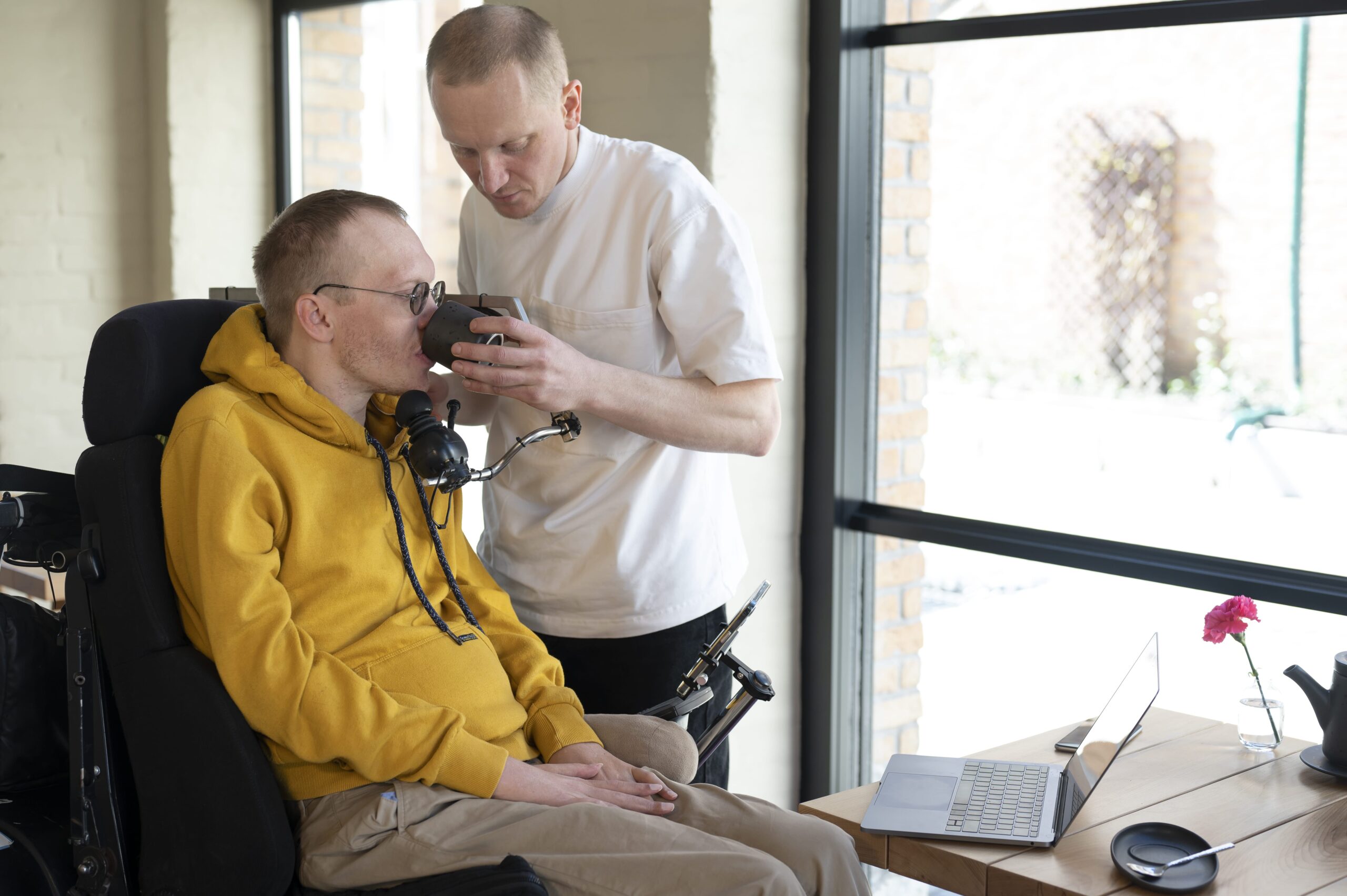Caring for someone with dementia can be a journey filled with challenges and heartwarming moments. While sparking happiness, fostering connection, and offering a sense of purpose are core goals, finding a variety of meaningful activities and fun can feel like a puzzle.
Whether it’s singing along to old tunes or putting together a memory box filled with cherished mementoes, you can create small and new activities to elevate the mood and quality of life of dementia patients at any stage. These recreational activities will tap into past skills and interests, fostering a sense of purpose and accomplishment for individuals with dementia.
This guide explores 101 activities that in-home care providers can incorporate into daily routines. These activities help dementia patients live better lives by stimulating their senses, fostering social relationships, and ultimately enhancing their quality of life.
Why are Activities Important For Dementia Patients?
Before moving into specific activities, it’s essential to recognise why engaging with dementia patients is so important:
- Cognitive Stimulation: Regular mental exercises can help slow cognitive decline.
- Emotional Well-being: Meaningful activities reduce feelings of anxiety, depression, and isolation.
- Physical Health: Many activities incorporate gentle physical movement, promoting better overall health.
- Sense of Purpose: Engaging in activities provides a sense of accomplishment and purpose.
- Social Connection: Group activities foster social interaction, which is crucial for emotional health.
Need guidance on dementia care? Our team is here to support you—Contact us to discuss your needs.
What are 101 ideas for things to do with dementia patients?
People with dementia and Alzheimer’s often find it frustrating to live everyday life with no work, which can indirectly lead to resistance to dementia care. Their everyday challenge is to live a normal life, but it is just difficult for them to do so. Such incompetence causes them to get irritated, annoyed, or bored.
Numerous studies suggest that Dementia and Alzheimer’s patients benefit from engaging in enjoyable activities. In addition to keeping them in high spirits and preventing depression, stimulating activities can also ease anxiety and irritation.
Here are the 101 activities you can enjoy with dementia patients:
Reminiscence Activities for Dementia Patients at Home
Reminiscence exercises enable people with dementia to remember their past and stimulate long-term memory. These activities involve reliving and sharing prior experiences, which may be both calming and entertaining for dementia patients. Here are some ideas:
- Reminisce with old photos
- Look through old magazines or newspapers
- Create a scrapbook of memories
- Look through a photo album together
- Make a family tree poster
- Sort through a box of old letters and cards
- Talk about famous events
- Listen to a favourite childhood story
- Listen to a favourite fairy tale
- Look through a book of children’s songs
Sensory Activities for Seniors with Dementia
Sensory activities engage the five senses and can be both relaxing and stimulating. These activities are particularly beneficial for patients in the later stages of dementia, providing comfort and reducing anxiety. Here is the list of ideas:
- Listen to your favourite music
- Have a gentle hand massage with scented lotion
- Paint with watercolors
- Play with soft fabrics
- Hear calming nature sounds
- Finger paint with non-toxic paint
- Smell fresh flowers or herbs
- Play with sensory fidget toys
- Create a sensory garden
- Play with a kaleidoscope
Cognitive Activities for Mental Stimulation
Cognitive activities are designed to engage a dementia patient’s mind, help maintain cognitive function, and provide a sense of accomplishment. They should be simple yet stimulating and tailored to the patient’s cognitive abilities.
- Play simple card games like Go Fish
- Sort objects by colour or shape
- Read aloud from labels
- Arrange coloured beads into patterns
- Play simple board games like Snakes and Ladders
- Sort coins into different containers
- Build with building blocks or Legos
- Play with a simple shape sorter toy
- Sort playing cards by colour
- Look through a book of riddles
Physical Activities for Dementia Patients
Physical activities are vital for maintaining physical health and emotional well-being. Gentle exercises and movements help improve mobility, balance, and mood. The following are some of the activities that you can enjoy with dementia patients:
- Enjoy walks in a safe environment
- Do gentle stretching exercises
- Do chair yoga exercises
- Play with balloons
- Have a picnic in the backyard
- Play with a balloon volleyball
- Dance to your favourite songs
- Take a ride on a bus or train
- Play catch with a stuffed animal
Looking for more ways to keep your loved one engaged? Discover our comprehensive dementia care services—get in touch now.
Creative Expression Activities
Creative activities allow dementia patients to express themselves and engage their senses. These activities are fulfilling and can help improve fine motor skills. Artistic expression can be incredibly fulfilling for dementia patients. They are:
- Make a collage from magazines
- Cut-out paper dolls
- Paint with string
- Decorate placemats
- Make a May basket
- Sew sewing cards
- Create greeting cards
- Colour an American flag
- Write a short poem
- Mould dough into fun shapes
Fulfilling Activities for People with Dementia at Home
Engaging in simple household tasks can provide a sense of accomplishment and routine. These activities are familiar and can help dementia patients feel productive. Engaging in purposeful activities can give a sense of accomplishment and routine for dementia patients:
- Bake simple recipes together
- Arrange flowers in a vase
- Folding laundry or towels
- Practice simple gardening tasks
- Sort and organise household items
- Do simple household chores together
- Water house flowers
- Decorate a flowerpot
- Plant seeds indoors or out
- Make homemade jam or preserves
- Volunteer together at an animal shelter
- Decorate a family photo frame
Digital and Audio-Visual Engagement for Dementia Patients
Modern technology offers unique opportunities for engagement through digital and audio-visual means.
These activities can be beneficial when in-person interaction is limited. Technology can provide new ways for dementia patients to engage with the world, whether through virtual visits with family, watching favourite shows, or exploring digital games designed for cognitive stimulation.
- Watch familiar movies or TV shows.
- Listen to audiobooks
- Play with a sensory light projector
- Have a video chat with friends or family
- Play with a handheld electronic game
- Hear a guided relaxation recording
- Listen to a favourite radio programme or podcast
Social Activities for Emotional Well-being
Social activities help combat feelings of isolation and depression, which are common in dementia patients. Engaging in social activities can improve mood, reduce anxiety, enhance overall well-being, and form bonding.
Encouraging social interactions can help combat loneliness:
- Have afternoon tea
- Host a spelling bee
- Play a game together
- Sing songs or hymns
- Watch a classic movie together
- Share nursery rhymes
- Read poetry out loud
- Volunteer together at an animal shelter
- Invite children to visit
- Dress in team colours and talk about sports
Need Help Finding the Perfect Activities or Care Options? Our team will help you create a care plan that includes engaging activities tailored to your loved one’s interests and abilities. Reach out to us today.
Nature and Outdoor Activities
Engaging in outdoor activities can be a relaxing and rejuvenating way to connect with nature.
These activities provide fresh air, physical movement, and a change of scenery, all of which are important for maintaining mental and physical health. Outdoor activities can be as simple as a walk in the garden or as involved as a picnic or birdwatching.
- Watch birds from the window.
- Create a sensory garden.
- Have a picnic in the backyard.
- Plant seeds indoors or out
- Rake garden leaves
- Blow bubbles outdoors
- Take a ride on a bus or train to see different scenery
Seasonal and Holiday-themed Activities
Incorporating seasonal themes adds variety and helps orient patients to the time of year.
These activities can be festive and fun, offering a sense of normalcy and tradition. Celebrating holidays and seasons can help dementia patients feel more connected to the world around them and provide opportunities for creativity and social interaction.
- Decorate a flowerpot (Spring)
- Plant seeds indoors or out (Spring/Summer)
- Have a picnic in the backyard (Summer)
- Make homemade jam or preserves (Fall)
- Decorate a family photo frame (Winter/Holidays)
Other Engaging Activities for Dementia Patients
In addition to the popular activities previously mentioned, numerous other engaging activities can bring joy and stimulate the senses of dementia patients. These activities offer variety and serve different interests and abilities, helping to keep daily routines fresh and enjoyable. Here are some creative and interactive options to consider:
- Play with a musical instrument like a tambourine
- Sort and stack cups
- Play with a simple wooden train set
- Roll yarn into a ball
- Look through a book of animal photos
- Pop popcorn together
- Name the presidents/prime ministers
- Trace and cut leaves from paper
- Play with a simple stacking toy
- Mold clay into different shapes
- Finish Bible quotes
Key Considerations When Planning Activities
Keeping a loved one with dementia engaged and stimulated is essential for their well-being. When selecting and implementing activities for dementia patients, keep these factors in mind:
1. Consider the Stage of Dementia:
- Early-Stage Dementia: Focus on activities that promote independence and cognitive stimulation, such as puzzles, gardening, reminiscing, or simple crafts.
- Mid-Stage Dementia: Prioritise activities that bring comfort and familiarity, such as listening to music, light exercise, sorting objects, or looking at photo albums.
- Late-Stage Dementia: Emphasise sensory stimulation through gentle touch, soothing music, aromatherapy, or offering preferred snacks.
2. Cater to Their Interests:
Think about their hobbies, experiences, and favourite things to do with someone. Did they enjoy music? Gardening? Cooking? Plan activities that they may find joyful and connect them to their past.
3. Keep it Simple and Fun:
Start with activities that are easy to understand and don’t require complex instructions. As they succeed, they gradually increase the difficulty to keep them engaged. Most importantly, focus on creating a positive and enjoyable experience, which can help avoid mistakes in dementia care and result in joyful activity.
Also Read: 6 Must-Have Assistive Technology Options for Dementia Patients!
Summing Up!
Keeping someone with dementia or Alzheimer’s disease engaged and having fun isn’t just about occupying their time—it’s about infusing their day with moments of joy and purpose. Whether it’s playing soothing music that evokes fond memories or enjoying simple games that encourage movement and laughter, countless activities can have a positive effect on their well-being.
It’s important to celebrate their achievements, no matter how small, and to remain patient throughout the process. By integrating these 101 ideas into their daily routine, we can not only ensure they stay active and engaged but also enhance their quality of life.
Ready to provide your loved one with the best dementia care services in Sydney? Contact us today. We will help you create a nurturing environment where your loved one can thrive and enjoy a fulfilling life despite their condition.


